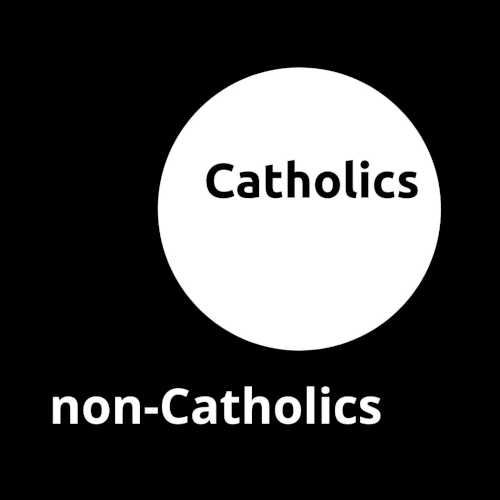
It is the Week of Prayer for Christian Unity – well, Christians aren’t united about when to pray for Christian unity, so the Northern Hemisphere and the Southern Hemisphere pray at different times of the year for this. Now it is the Southern Hemisphere praying for it.
That is a good time to reflect on the term “non-Catholics”.
Point 1: are there many other groups (are there ANY other groups) that divide the world’s population into two in this manner – rugby-players and non-rugby-players; Australians and non-Australians; accountants and non-accountants…?
Point 2: I haven’t just seen Catholics make this binary distinction. I come across non-Catholics referring to themselves as “non-Catholic”! That feels to me like me referring to myself, identifying myself as “non-Bulgarian”! This Catholic (unique/rare) binary usage of “non-Catholic” has so entered the mainstream that non-Catholics use it as a self-identifier!
Point 3: The word “catholic” has been taken over by those in communion with the Bishop of Rome. Eastern Orthodox, Anglicans, and many, many others, regularly affirm that they are part of the “one holy catholic and apostolic church” (Nicene Creed), yet allow themselves to be referred to as “non-Catholic”! [Catholics are not alone in taking over a word in this manner; “Orthodox” and “Evangelicals” immediately spring to mind – but do they divide the world into, say, Evangelical and non-Evangelical in quite the same tribal manner? Would Evangelicals refer to everyone from Buddhists through atheists to people differing in their own denomination all equally as “non-Evangelicals”?
Point 4: There is no distinction within the concept of non-Catholic – an atheist is just as much a non-Catholic as an Eastern Orthodox bishop. A Hindu is just as much a non-Catholic as an Anglican or Old-Catholic who upholds episcopacy and Christ’s eucharistic presence. Further: those who use this “non-Catholic” language regularly speak of “conversion” if such a non-Catholic becomes a “Catholic”. Such a person would call an atheist becoming Roman Catholic, conversion. But such a person would also call it conversion if an Anglican bishop becomes Roman Catholic.
Point 5: I wonder if the term “non-Catholic” can be found in any contemporary Vatican documents? I have searched long and hard and cannot find any such occurrence. If you can, let me know. It seems to be a term that, if it ever was an official one, was buried at Vatican II.
Point 6: Perhaps it is a time to stop using “non-Catholic” and to call people out who continue to use it. “non-Catholic” is not a catholic term. It is not a Catholic term. It is a term that shouldn’t be used. It is not a helpful concept. It is not used by the Vatican and shouldn’t be used by those in communion with the Vatican. Nor by those not in communion with the Vatican.



From a non-Catholic catholic:
It is much better to talk about Christianity divided into Catholics and ecclesial communities, isn’t it?
🙂
(I saw a meme thingy recently on Twitter but didn’t repost it because one of the people was somewhat underdressed (putting it diplomatically) but the gist of the meme was this:
Anglican to Orthodox and Catholic: I am not in communion with either of your churches.
Catholic to Orthodox and Anglican: I am only in communion with other Catholics and the Orthodox.
Orthodox to Catholic: Er …
Thanks, Peter. I think I saw the same meme & similarly, didn’t retweet it 🙂 Easter Season Blessings.
Hi Bosco. Interesting and learned collection of observations, thank you. But would you identify as “catholic”? If so, I’m guessing there characteristics of your faith formulas and observations that you are short-handing into that term. And if you do, what term (if any) would you use for Christians who have a different formulation. Or is your point that there should not be a “non” anything, as each should be called by a term which describes them more accurately and positively (and perhaps using a term of their choice).
Name tags can be useful in helping us to understand our world. It is a common function of civilization for likeminded people to gather themselves and choose a name. But used wrongly, this can lead to an unhealthy exclusion and marginalization of those who are not in the gathering. It’s tricky. Best wishes.
Thanks, John, for your helpful reflection.
I would highlight that you are asking how one might refer to Christians who do not hold to catholic understandings (actually, I did it just then!). In my post, I was noting that the term “non-Catholic” isn’t simply a shorthand “for Christians who have a different formulation”, it is a term that is used, without distinction, within and beyond Christianity.
Within Christianity, I have already shown, in the second sentence of this comment, how I might phrase things. Is there a parallel to my regarding myself as a Bible-believing Christian (as well as a catholic one). I really don’t see myself talking about some Christians being non-Bible-believing Christians.
Easter Season Blessings.